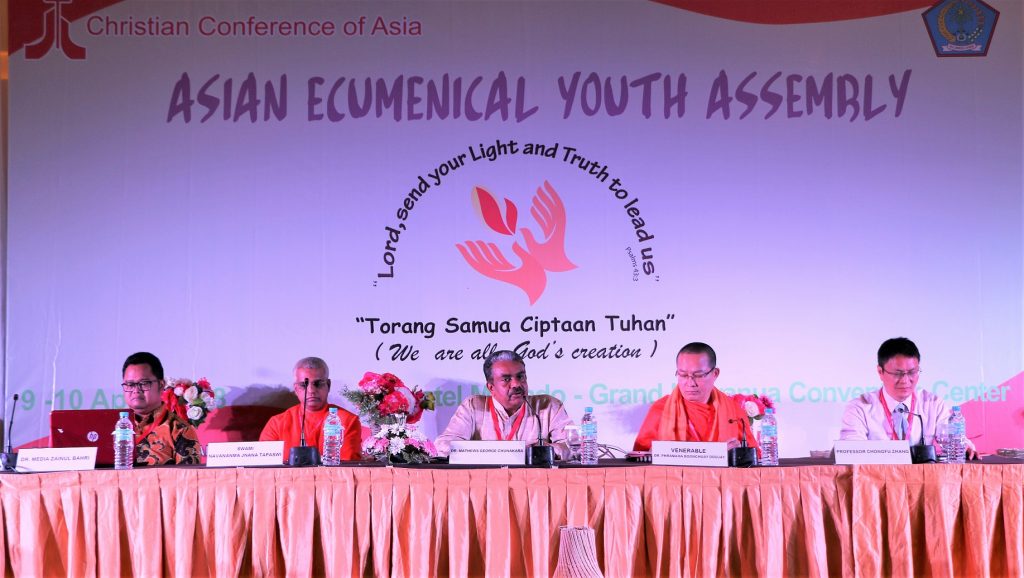Interfaith Dialogue on Light and Truth in Pluralistic Asia sheds light to pressing issues

(In photo left to right: Rev. Dr. Aris Margianto, Swami Navananma Jnana Tapaswi, Dr. Mathews George Chunakara, Venerable Dr. Phramaha Boonchuay Doojai, Professor Chongfu Zhang)
Two sessions in the afternoon on the third day of the AEYA focused on ‘Light and Truth in Pluralistic Asia’ for interfaith dialogue between Religious leaders and scholars from the Buddhist, Islamic, Hindu and Taoist and the AEYA participants entered into a common ground to discuss relevant issues about religion and their implications to the Asian society.
The panelists — Swami Navananma Jnana Tapaswi (Hinduism); Venerable Dr. Phramaha Boonchuay Doojai (Buddhism); Prof. Chongfu Zhang (Taoism) and Dr. Media Zainul Bahri (Islam) —made presentations on the theme ‘Light and Truth in a Pluralistic Asia’ in the perspectives of respective religion.
Christian Conference of Asia’s (CCA) General Secretary Dr. Mathews George Chunakara, moderated the session.
Swami Navananma, who started his presentation with a brief prayer in Sanskrit, took on questions of religious extremism by saying regional and geographical interpretations of different holy scriptures were dividing people instead of unifying them.
He said that “instead of making people’s lives more harmonious, interpretations of religious texts were being used to create more friction and rifts in society.” He extolled the participants of AEYA to change “internally” so that the change could be reflected in their homes and society.
Swamy Navananma, said that the only way to learn Dharma, or awareness, was by practicing it.
“Dharma is based on the will of God. It’s a natural thing and cannot be learnt from texts and scriptures. It is like wanting to learn swimming by reading books about it,” he said.
“As time passes, the true sense of truth keeps fading. While it should be enriched, it should be done spiritually and not religiously. Once we do that, peace will automatically follow,” he added.
Dr. Media Zainul Bahri, who represented Islam, said that wrong-doings in the ‘name of Islam’ were based on wrong interpretation of the Holy book.
“Islam is known as a religion of peace, but unfortunately, there are a lot of extremist acts being carried out in Islam’s name,” he said.
“People talk about Jihad. But what is Jihad? There is a great difference between Jihad and war. Jihad just means the ‘struggle for a better life,’ while war is war. Nothing good ever comes out of it. Jihad is never Islam’s call to fight against others. Nothing connects Jihad with war.”
Venerable Dr. Phramaha Boonchuay Doojai was of the opinion that conscious steps needed to be taken towards building bridges with other religions and making friends. He spoke about one of his personal experiences.
“A great way to understand others’ religions is to visit their places of worship. Go to a church or a mosque and ask if you are allowed to enter. Once, I visited an ancient mosque in Phuket, Thailand. The Imam welcomed me and said I was the first Buddhist monk to have visited the mosque. I feel this is the first step we have to take if we are to see changes happening,” he said.
One of the young attendees raised a question about the future of ecumenical movements in Asia, and whether ecumenical harmony was something that was achievable in his lifetime.
Prof. Chongfu Zhang, who was one of the respondents to the question, said things could not be changed overnight.
“We cannot change things over a few days or a few months. These are problems that grew over many years and generations. In the past, many suggestions were put forward on how to resolve ecumenical issues. But none of them succeeded,” he said.
“What could you possibly do to help resolve it? The first thing is to open your eyes. Many people refuse to do so and isolate their religion from the rest of the world. Secondly, respect others. Even though we may not be able to resolve things completely, we can contribute towards making things a little better.”
“The AEYA conference is a good beginning for people from different religions to exchange their views. That is why I think this meeting in Manado is a very important gathering,” he added.
CCA General Secretary summarised the whole interfaith dialogue session with challenging words: “I am reminded of an ancient Indian adage. that, ‘I believe I have the truth; You believe you have the truth; I will respect your truth, so you please respect my truth”.
“Are we prepared to ask ourselves this question? That is what we need to ask ourselves at this point.” he concluded.










